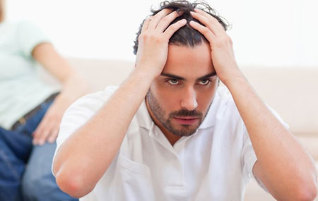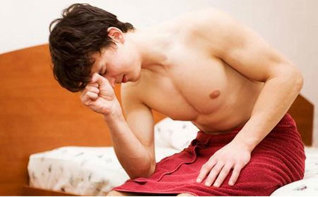Prostate cancer iron — is the most vulnerable organ in the male body. Diseases of the prostate occur in every third man aged 20 years. When this hyperplasia and adenoma, which leads to problems with erection, they are most often the result of chronic inflammation of the prostate gland. This is the reason why it is necessary to know the characteristic symptoms of chronic inflammation of the prostate and how to treat it.

Chronic prostatitis — what is it?
Chronic prostatitis — this is a long flowing into the prostate gland inflammatory process. The term includes several forms of the disease, manifested by similar clinical symptoms.
Category chronic inflammation of the prostate gland:
- Infectious — caused by bacteria, fungus or virus;
- Non-transferable (stagnant) — otherwise called the syndrome of chronic pelvic pain, drops with the symptoms of inflammation, or without them;
- Asymptomatic — in the complete absence of clinical manifestations of inflammation recorded only when a careful examination of the prostate.
In 95% of cases are diagnosed with non-communicable chronic prostatitis. In this the first plan for the development of inflammation are stagnant phenomena in the prostate gland — its secretion, or the same blood circulation in the veins.
The risk of the disease chronic inflammation of the prostate common among people:
- leading irregular sexual life, exercise regularly, interruption of sexual intercourse to avoid pregnancy partner;
- office staff and driver (sedentary work causes stagnation of blood in the pelvis);
- prefer to wear tight underwear;
- alcohol abuse and smoking.
Chronic prostatitis: signs of deterioration
Chronic prostatitis develops gradually, and for many years and can cause anxiety. Periodically a man may mean:
- Discomfort in the crotch area;
- The pain, the minimum intensity with a characteristic of the irradiation in the sacrum, rectum, sex organs;
- Some more frequent urination with the appearance of pain and the small pathological secretions from the urethral channel, a weak stream of urine;
- Pain the head of the penis after ejaculation (disappearing within 30 min);
- Burning in the urethra, the occurrence of pain during sexual act.
Stress, hypothermia, transmitted infections, which lead to the weakening of immunity, and eating spicy food/drinking alcohol can cause exacerbation of chronic inflammation of the prostate gland. In this case the intensity of the painful manifestations are increasing and resembles acute inflammation.
With the development of the disease and the involvement in the pathological process of the nerves more stronger erectile dysfunction, which significantly affects the psychological state of the patient.
However, chronic prostatitis is full of not only a violation of potency — weak erections, reduction of sensations during orgasm or their complete absence, premature ejaculation.

Often the disease leads to the development of cystitis, pyelonephritis, and inflammation of the testicles, aggravated during basic pathology. In addition, significantly increases the risk of stone formation in the prostate gland, adenoma or the formation of a malignant tumor. In the long-term course of chronic inflammation of the prostate develops infertility.
Symptoms of chronic inflammation of the prostate forms and stages
Symptoms of chronic inflammation of the prostate gland are dependent on the form of the disease and the stage of the disease (exacerbation or remission).
Chronic bacterial prostatitis
Symptoms of chronic inflammation of the prostate caused by pathogenic microflora, appearing regularly with varying intensity. During an exacerbation of the symptoms of inflammation of the most striking. Infectious, chronically leaking prostatitis is manifested by:
- Common symptoms of inflammation in the body — an increase in temperature, weakness, chills, muscle pain (occurs when the deterioration);
- syndrome local inflammation — soreness of the abdomen, increasing during sexual intercourse, after defecation and urination, with prolonged absence near;
- Violations from the side of genitourinary system — irregular urination, broken erectile ability;
- Deviations in laboratory research — uncovering the secrets of the prostate and analysis of urine for bacteria/fungus, signs of inflammation in the analysis of the blood (leukocytosis, increased ESR), and urine (leukocyturia, proteins).
Outside the exacerbation of the inflammation symptoms of chronic inflammation of the prostate gland erased. The patient's complaints more point to the broken urination, decrease in sexual desire and other erectile disorders, that cause significant nervousness.
Non-communicable chronic prostatitis: syndrome of chronic pelvic pain
The name itself points to prevalent in this type of chronic inflammation of the prostate symptom — pain. Due to the small intensity of the pain, chronic prostatitis non-transferable nature often remains unnoticed.
With the passage of time the pain slightly more intense, and in the clinical picture there are signs of disorders of sexual function, conditioned the progress of the stagnant phenomena and the reduction of muscle tone of the pelvic floor muscles and urinary sphincter.
Often the disease is asymptomatic. Diagnosis of chronic prostatitis put, when it detects signs of inflammation of the prostate gland and its hyperplasia at the time of the diagnostic studies. In the analysis of urine can regularly lockable leukocyturia.
Methods of treatment of chronic inflammation of the prostate
In any case, the treatment of chronic inflammation of the prostate gland requires an individual selection of therapeutic scheme. This option takes into account the cause of the disease (infection, stagnation of secretion or venous blood), duration of flow, and the availability of aggravating the pathology.
Medical therapy:

- Antibacterial drugs — antibiotic treatment is indicated only when expressed inflammation, the identification of the bacterial agent in the urine or the secret of the prostate. Antibiotic therapy lasts 2-8 weeks. After completing the course symptoms of the disease are often stored in full, even if the infectious factor is completely eliminated.
- Alpha - adrenoblockers — determine when an increase in pressure, hypertonus of the muscles of the bladder. Their use does not bring any effect in violation of the innervation of the muscle and disorders of the pelvic floor.
- Symptomatic treatment of chronic inflammation of the prostate gland — for cupping pain syndrome apply drugs NSAIDS often in the tablets, to eliminate the anxiety are advised to intake of selective antidepressants. Hormonal therapy — treatment with androgens is carried out in accordance with the variations in hormonal levels.
- Immunostimulants — appointed only in the best laboratory of immunodeficiency.
- Means, which regulate the levels of uric acid — useful only in the detection of stones in the prostate gland.
- Vitamin therapy — the means of choice in the treatment of chronic inflammation of the prostate gland are available vitamin-mineral complexes. Their substitution for the advertised food Supplements does not bring the healing outcome, in addition to the unnecessary waste of money.
Surgical treatment of inflammation of the prostate
Depending on slowing the disease process, from which the of chronic prostatitis, apply a transurethral resection of the prostate (often replaced open surgery), endoscopic drainage of formed cysts of the prostate, surgical correction of the seminal vesicles in disorders of the outflow of secrets.
In a wide sclerosis performed prostatectomy. When prostatic hyperplasia effective ablative techniques — microwave thermotherapy and laser ablation.
Other methods of treatment of chronic inflammation of the prostate
Some doctors are actively prescribed for patients with chronic inflammation of the prostate gland, different methods of physical effects on the prostate. However, most of them have a number of contraindications and appointed only in certain cases:
- Prostate massage (is available only a small part of the gland) when hyperplastic changes in the body may cause acute retention of urine and contributes to the spread of the inflammatory process (until the development of sepsis). Also massage can not be performed when stones and cysts of the prostate, expressed venous stasis. Release prostate from the stagnant secret, best to happening in natural ejaculation.
- Gymnastics for the bladder — special exercises for stretching the intervals between urination to 4-5 hours effective when violations of muscle tone of the bladder and its sphincter. However, their effectiveness is significantly reduced when a specific syndrome.
- Instillation — the deep injection of drugs into the urethra is very painful and fraught with complications.
- Electrical stimulation, ultrasound and phonophoresis, magnetic therapy and other methods of muscle stimulation suitable in the application only for the reduced tone of the muscles of the pelvic floor. Physiotherapy provide only temporary relief, but a stable effect is achieved by the removal of the causes of the disease.
- Folk methods — home recipes (pumpkin seeds with honey, alcohol tincture of the bark of aspen and other) shall apply only with the consent of the treating andrologist and in any case not a substitute for medical treatment.
Prognosis: it is possible to cure chronic prostatitis?
The forecast long-term exposure to inflammation of the prostate is directly dependent on the timeliness of patient treatment for the qualified help. As you may have noticed, the symptoms and treatment of chronic inflammation of the prostate gland in men is closely linked — without hyperplastic changes in the gland and dystrophies, provided a comprehensive treatment, it is possible to achieve a lasting improvement in the condition.

Important in this radically rethink your life: remove-inducing stagnation factors, how to get rid of bad habits and fully eat.
























